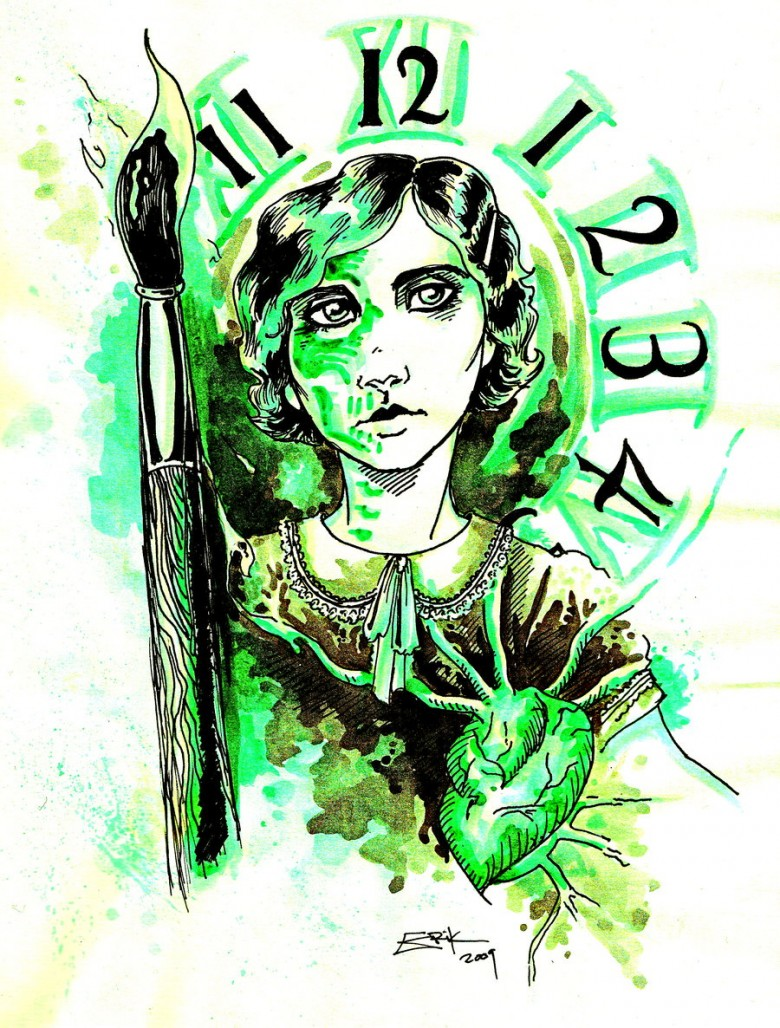Imagine your mouth aglow with a phosphorescent green light. You would literally be glowing in the dark. While that may sound like a rather fascinating hallucination, it was all too real for the young women who worked in the factory of the U. S. Radium Corporation in the 1920s, painting luminous dials for watches that were all the rage for flappers and their beaux. They sat all day dipping brushes in a concoction of radium paint, making tiny strokes onto the dials, and then putting the brushes in their mouths to “point” the tip before dipping them back into the radium paint – “lip, dip, pain.t” They did this day after day, week after week, month after month. The results were as you would now expect – anemia, bone fractures, jaws completely rotted, and eventually, death.
Radium Girls is the 7th edition of Subversive Theatre Collective’s “Subversive Youth Series,” performed by the students of Buffalo Academy for Visual and Performing Arts, and directed by Kelly Beuth. It chronicles the exposure of radium as a deadly chemical that caused serious health problems and the deaths of the young factory workers. As a result of the lawsuit brought against U. S. Radium by five factory workers, labor safety standards were enhanced and the laborers' right to sue a corporation for damages was established.
This is a stripped-down production of the two act play, running just over an hour with no intermission. The simple set by J. Tim Raymond has tables and chairs along with black cubes with the chemical formula Ra painted on them. The use of a white backdrop to project dates and times provides the timeline and places for each short scene – the factory, hospital, courtroom, and various homes – is effective in keeping the action moving.
Grace Fryer (Corinne McLoughlin), a worker at the factory who fights for the lawsuit against U.S. Radium, and Arthur Roeder (Casey Appenheimer), the President of the company, are the central characters in the play. Ms. McLoughlin is excellent as Grace, a naïve young woman who gradually finds her inner strength to fight for herself and her co-workers as her health deteriorates. Mr. Appenheimer expresses the conflict of a man who is not intrinsically evil, but does evil things out of greed and fear. Molly Lewars plays several roles, all very well. As Dr. Von Sochocky, the man who developed the paint, she shows remorse for the pain caused, and compassion for the people harmed by it, and has a great accent.
In a bit of comic relief in one short scene, Daleina Valdiva, Alisha Chardon, and Atraeu Richardson, who is a hoot as a cowboy offering his ranch as a place to rest, play people who write to the Radium Girls in support of their cause, each having something to offer.
Some of the actors were rushing lines on opening night, speaking so fast that their words were incomprehensible. Opening night jitters? Hopefully, they will settle in and slow it down a bit.
One line in the play stayed with me, as true today as it was almost 100 years ago. Miss Wiley (Isabelle Trump) explains to Grace that she must smile for the camera even when full of rage at what has happened to her and her co-workers, because “The public has no sympathy for an angry woman.” Being women, the Radium Girls had to overcome their own training, as well as face the wrath of a society still not accepting of strong, angry women. Some things take a very long time to change…
This is a powerful, true story of social change, well told by Ms. Beuth and her young actors. Change for the better occurs because people with little power decide to speak up, stand up, and refuse to back down in the face of powerful forces. In doing so, they gain their own power to effect change. It happens over and over and over. And each time, the lives of people not-yet-born are just that much better than their forebears.
It takes great courage to do what Grace Fryer and her co-workers, the Radium Girls, did. You can see what they faced and the outcome at the Manny Fried Playhouse this weekend and next, Thursdays, Fridays and Saturdays at 8:00pm through July 1st.

